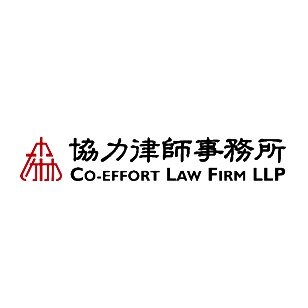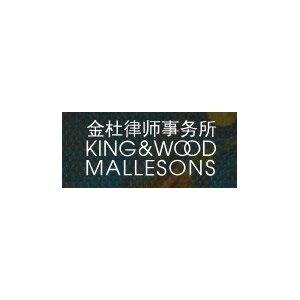Best Antitrust Litigation Lawyers in Beijing
Share your needs with us, get contacted by law firms.
Free. Takes 2 min.
List of the best lawyers in Beijing, China
About Antitrust Litigation Law in Beijing, China
Antitrust litigation in Beijing, China, refers to the legal process aimed at addressing and resolving disputes related to anti-competitive behavior in the marketplace. As the capital city, Beijing hosts major courts and regulatory bodies that are central to enforcing China's Antimonopoly Law. This law is designed to protect fair competition, prevent monopolistic practices, and safeguard consumer and businesses rights. Antitrust litigation can involve investigations and lawsuits brought by government authorities, businesses, or even consumers. Common issues include price-fixing, abuse of dominant market position, merger control, and monopolistic agreements.
Why You May Need a Lawyer
Antitrust laws in Beijing are complex and constantly evolving, and enforcement is robust. If you are a business owner, executive, or even a consumer affected by unfair business practices, you may need a lawyer for several reasons:
- Defending your business against allegations of monopolistic conduct or unfair competition.
- Initiating claims if you believe your company has been harmed by another party's anti-competitive behavior.
- Guidance during government investigations or dawn raids conducted by regulatory authorities.
- Assisting with compliance to ensure your business practices align with China’s Antimonopoly Law.
- Handling issues related to merger filings and approvals, which are highly regulated in Beijing.
- Helping individuals or groups bring class actions for damages caused by monopolistic practices.
Local Laws Overview
Antitrust litigation in Beijing is primarily governed by the Antimonopoly Law of the People's Republic of China (AML), which came into effect in 2008 and was amended in 2022. The AML prohibits three main types of monopolistic behavior:
- Monopolistic agreements between competitors, such as price-fixing or market division.
- Abuse of dominant market position, which includes practices like predatory pricing or refusing to deal with certain businesses.
- Concentrations of undertakings that may restrict or eliminate competition, requiring merger notifications and approvals for certain transactions.
Regulation and enforcement are overseen by the State Administration for Market Regulation (SAMR), and courts in Beijing are experienced in hearing complex antitrust cases. Penalties for violating antitrust laws can include substantial fines, orders to cease monopolistic conduct, and even liability for civil damages.
Frequently Asked Questions
What is antitrust litigation?
Antitrust litigation involves legal actions taken to resolve disputes arising from anti-competitive practices, such as monopolies, price-fixing, or abuse of market dominance that hurt competition or consumers.
Which authorities handle antitrust cases in Beijing?
The main regulator is the State Administration for Market Regulation (SAMR). In Beijing, courts at various levels, including the Beijing Intellectual Property Court, handle antitrust litigation.
Can a foreign business be sued for antitrust violations in Beijing?
Yes. If a foreign business’s activities affect competition within the Chinese market, including Beijing, it can be subject to investigation and litigation under the Antimonopoly Law.
What types of conduct may violate antitrust laws in Beijing?
Common violations include price-fixing, market allocation, bid-rigging, abuse of dominant position, exclusive dealing, and certain mergers that restrict competition.
How are antitrust investigations initiated?
Investigations can be started by the authorities based on market intelligence, complaints from consumers or competitors, or during routine regulatory checks.
What are the penalties for violating antitrust law in Beijing?
Penalties range from administrative fines that can exceed ten percent of annual turnover, to mandatory cessation of illegal conduct. Civil damages may also be awarded to harmed parties.
Can individuals bring lawsuits for antitrust damages?
Yes. Consumers and businesses that suffer loss due to monopolistic conduct can initiate civil litigation to seek compensation for damages.
Are all mergers subject to antitrust review in Beijing?
Not all, but those over a certain size or which meet specific market thresholds must be notified to SAMR for merger control review and approval.
How long does antitrust litigation usually take?
The timeline varies. Administrative investigations may conclude within several months, but court litigation, especially for complicated cases, can take a year or more.
Do antitrust laws apply to online businesses and digital platforms?
Yes. The Antimonopoly Law applies to digital platforms and online businesses, which have come under increasing scrutiny in recent years.
Additional Resources
If you need more information or wish to understand antitrust laws better, consider consulting the following resources:
- State Administration for Market Regulation (SAMR) - Main body enforcing antitrust regulations.
- Supreme People’s Court of China - Issues judicial interpretations related to antitrust cases.
- Beijing Intellectual Property Court - Handles a significant number of antitrust and competition disputes.
- China Consumers Association - Offers assistance and information for consumers affected by monopolistic conduct.
- Local Bar Associations in Beijing - Can help connect you with qualified antitrust lawyers.
Next Steps
If you believe you are affected by anti-competitive behavior or are involved in a potential antitrust issue in Beijing, follow these steps:
- Gather all relevant documents and evidence related to your case, including contracts, correspondence, or details of the behavior in question.
- Consult with a qualified lawyer who specializes in antitrust law in Beijing. They can assess your situation and advise on the best course of action.
- Consider filing a complaint with the State Administration for Market Regulation (SAMR) if you suspect a violation.
- If you face a government investigation or lawsuit, seek legal representation as soon as possible to protect your rights and interests.
- Stay informed about your legal obligations and rights under the Antimonopoly Law to ensure compliance and risk mitigation for your business or personal interests.
Navigating antitrust litigation in Beijing can be challenging. Professional legal advice and early engagement with knowledgeable counsel will significantly improve your chances of a favorable outcome.
Lawzana helps you find the best lawyers and law firms in Beijing through a curated and pre-screened list of qualified legal professionals. Our platform offers rankings and detailed profiles of attorneys and law firms, allowing you to compare based on practice areas, including Antitrust Litigation, experience, and client feedback.
Each profile includes a description of the firm's areas of practice, client reviews, team members and partners, year of establishment, spoken languages, office locations, contact information, social media presence, and any published articles or resources. Most firms on our platform speak English and are experienced in both local and international legal matters.
Get a quote from top-rated law firms in Beijing, China — quickly, securely, and without unnecessary hassle.
Disclaimer:
The information provided on this page is for general informational purposes only and does not constitute legal advice. While we strive to ensure the accuracy and relevance of the content, legal information may change over time, and interpretations of the law can vary. You should always consult with a qualified legal professional for advice specific to your situation.
We disclaim all liability for actions taken or not taken based on the content of this page. If you believe any information is incorrect or outdated, please contact us, and we will review and update it where appropriate.

















